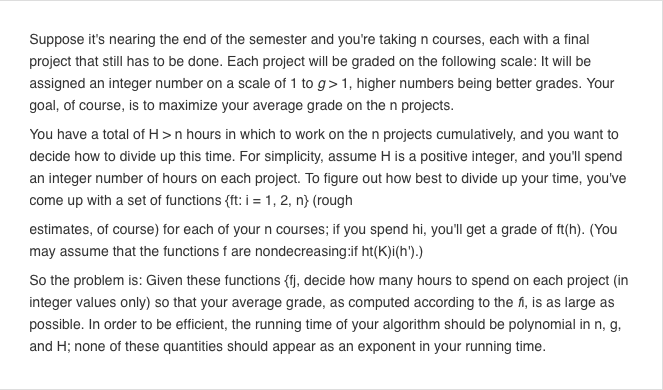This is a question from textbook "Algorithm Design" Chapter 6 Exercise 20
https://www.chegg.com/homework-help/Algorithm-Design-1st-edition-chapter-6-problem-20E-solution-9780321295354

Suppose it's nearing the end of the semester and you're taking n courses, each with a final project that still has to be done. Each project will be graded on the following scale: It will be assigned an integer number on a scale of 1 to g> 1, higher numbers being better grades. Your goal, of course, is to maximize your average grade on the n projects You have a total of H>n hours in which to work on the n projects cumulatively, and you want to decide how to divide up this time. For simplicity, assume H is a positive integer, and you'll spend an integer number of hours on each project. To figure out how best to divide up your time, you've come up with a set of functions {ft:-1, 2, n)(rough estimates, of course) for each of your n courses; if you spend hi, you'll get a grade of ft(h). (You may assume that the functions f are nondecreasing if ht(K)(h).) So the problem is: Given these functions (fj, decide how many hours to spend on each project (in integer values only) so that your average grade, as computed according to the fi, is as large as possible. In order to be efficient, the running time of your algorithm should be polynomial in n, g and H; none of these quantities should appear as an exponent in your running time Suppose it's nearing the end of the semester and you're taking n courses, each with a final project that still has to be done. Each project will be graded on the following scale: It will be assigned an integer number on a scale of 1 to g> 1, higher numbers being better grades. Your goal, of course, is to maximize your average grade on the n projects You have a total of H>n hours in which to work on the n projects cumulatively, and you want to decide how to divide up this time. For simplicity, assume H is a positive integer, and you'll spend an integer number of hours on each project. To figure out how best to divide up your time, you've come up with a set of functions {ft:-1, 2, n)(rough estimates, of course) for each of your n courses; if you spend hi, you'll get a grade of ft(h). (You may assume that the functions f are nondecreasing if ht(K)(h).) So the problem is: Given these functions (fj, decide how many hours to spend on each project (in integer values only) so that your average grade, as computed according to the fi, is as large as possible. In order to be efficient, the running time of your algorithm should be polynomial in n, g and H; none of these quantities should appear as an exponent in your running time







